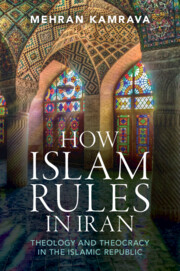Book contents
- How Islam Rules in Iran
- How Islam Rules in Iran
- Copyright page
- Contents
- Preface
- 1 Introduction
- 2 The Setting
- 3 A Question of Jurisprudence
- 4 Social Protection and Guidance
- 5 Rethinking the Islamic Republic
- 6 Theorizing Islamic Democracy
- 7 Legitimate Authority
- 8 Khameneism and the Absolute Velayat-e Faqih
- 9 Whither the Islamic Republic?
- Appendix Brief Biography of Some of the Figures Discussed
- Glossary
- Bibliography
- Index
1 - Introduction
Published online by Cambridge University Press: 02 May 2024
- How Islam Rules in Iran
- How Islam Rules in Iran
- Copyright page
- Contents
- Preface
- 1 Introduction
- 2 The Setting
- 3 A Question of Jurisprudence
- 4 Social Protection and Guidance
- 5 Rethinking the Islamic Republic
- 6 Theorizing Islamic Democracy
- 7 Legitimate Authority
- 8 Khameneism and the Absolute Velayat-e Faqih
- 9 Whither the Islamic Republic?
- Appendix Brief Biography of Some of the Figures Discussed
- Glossary
- Bibliography
- Index
Summary
In today’s Iran, state–religion relations exhibit three key features. An obvious feature is the deep basis of the state in innovative interpretations of Shia jurisprudence. The Islamic Republic is based on the system of the velayat-e faqih, generally translated in English as the “guardianship of the jurisconsult.” As a concept, the notion of the velayat-e faqih had existed in Shia thought for some time before Ayatollah Khomeini elaborated on it in his 1970 book by the same name. Khomeini’s contribution lay in his innovative interpretation of the velayat-e faqih as a supreme political leader who oversaw not just religious affairs, as previous theologians had theorized but was in overall charge of all affairs of the entire community, profane and political as well as religious. Today, Khomeini’s conception of velayat-e faqih underlies the institutional and political foundations of the Islamic Republic. The Iranian political system is far more ideologically informed, and hence ideological, than may at first meet the eye.
Keywords
- Type
- Chapter
- Information
- How Islam Rules in IranTheology and Theocracy in the Islamic Republic, pp. 1 - 10Publisher: Cambridge University PressPrint publication year: 2024

